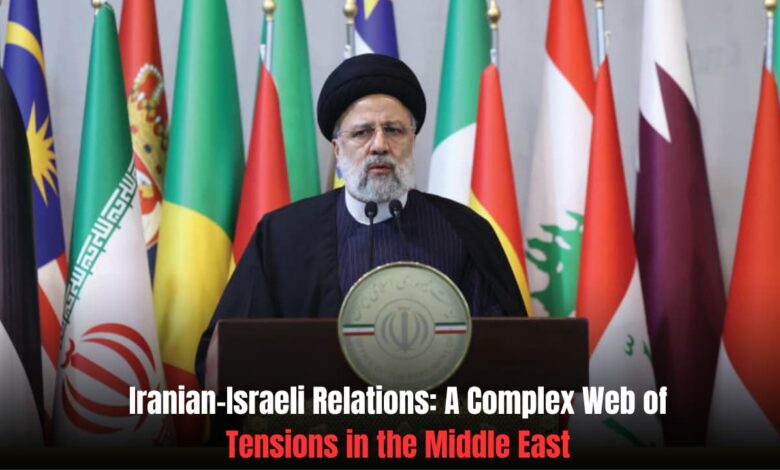Iranian-Israeli Relations: A Complex Web of Tensions in the Middle East

The Iranian-Israeli conflict is one of the most persistent and complex issues in the Middle East. For decades, these two nations have been locked in a battle of ideology, politics, and regional influence that has profound implications for the broader region. In this article, we delve deep into the intricacies of Iranian-Israeli relations, providing a comprehensive analysis that goes beyond the headlines to explore the underlying dynamics of this ongoing conflict.
Historical Context: The Roots of Tension
Understanding the Iranian-Israeli conflict requires a look back at the historical context that has shaped these two nations’ relations. Before the 1979 Iranian Revolution, Israel and Iran maintained a relatively friendly relationship. Iran was one of the first Muslim-majority countries to recognize Israel, and the two countries enjoyed strong diplomatic and economic ties. However, this all changed with the rise of the Islamic Republic of Iran.
The Iranian Revolution brought to power a regime that viewed Israel as an illegitimate state, an outpost of Western imperialism in the Middle East. The new Iranian government, under the leadership of Ayatollah Khomeini, severed all ties with Israel and began to support groups like Hezbollah and Hamas, which are committed to Israel’s destruction.
The Role of Proxy Wars
One of the defining features of the Iranian-Israeli conflict is the use of proxy wars. Instead of engaging in direct military confrontation, both countries have supported opposing sides in various regional conflicts. Iran has provided financial, military, and logistical support to groups such as Hezbollah in Lebanon, Hamas in the Gaza Strip, and various Shiite militias in Iraq and Syria. These groups have served as Iran’s proxies, engaging in conflicts with Israel and its allies on behalf of Tehran.
On the other side, Israel has conducted airstrikes against Iranian targets in Syria and has reportedly been involved in covert operations inside Iran, targeting nuclear scientists and military facilities. These proxy conflicts have allowed both countries to engage in a kind of low-intensity warfare that keeps the conflict simmering without boiling over into a full-scale war.
Nuclear Ambitions and Regional Security
The issue of Iran’s nuclear program has been a major flashpoint in its relationship with Israel. Israel has long viewed Iran’s nuclear ambitions as an existential threat, fearing that a nuclear-armed Iran would have the capability to destroy the Jewish state. This has led to a series of confrontations, both diplomatic and military, as Israel has sought to prevent Iran from acquiring nuclear weapons.
The international community, particularly the United States and the European Union, has also been involved in efforts to curtail Iran’s nuclear program. The 2015 Joint Comprehensive Plan of Action (JCPOA), commonly known as the Iran nuclear deal, was a major diplomatic achievement aimed at preventing Iran from developing nuclear weapons. However, Israel was a vocal critic of the deal, arguing that it did not do enough to dismantle Iran’s nuclear infrastructure and only delayed the inevitable.
Recent Developments and Escalations
In recent years, the Iranian-Israeli conflict has seen a number of escalations. The assassination of Iranian General Qassem Soleimani by a U.S. drone strike in 2020 was a major turning point, as Soleimani was a key figure in Iran’s regional strategy, particularly its support for proxy groups. Iran vowed revenge, and tensions soared as both sides prepared for potential retaliation.
More recently, Israel has intensified its air campaign in Syria, targeting Iranian forces and their allies. These strikes have been aimed at preventing Iran from establishing a permanent military presence in Syria, which Israel views as a direct threat to its security. At the same time, there have been reports of cyber-attacks and covert operations by both sides, further complicating the situation.
Economic Sanctions and Diplomatic Isolation
Economic sanctions have been a key tool used by Israel and its allies to pressure Iran. The United States has imposed a series of harsh sanctions on Iran, targeting its oil exports, financial sector, and key industries. These sanctions have had a crippling effect on the Iranian economy, leading to widespread economic hardship and social unrest.
Despite the economic pain, Iran has refused to back down from its support for anti-Israel groups and its nuclear ambitions. The Iranian leadership has portrayed these actions as a defense of Muslim and Palestinian rights, and as a stand against Western imperialism and Zionism.
The Abraham Accords: Shifting Alliances
One of the most significant developments in the Middle East in recent years has been the signing of the Abraham Accords. This series of agreements, brokered by the United States, has normalized relations between Israel and several Arab countries, including the United Arab Emirates, Bahrain, Sudan, and Morocco. These accords represent a major shift in the region’s geopolitics, as Arab states that were previously hostile to Israel have now chosen to establish diplomatic and economic ties with the Jewish state.
For Iran, the Abraham Accords are seen as a threat. Tehran views these agreements as part of a broader strategy by the United States and Israel to isolate Iran and weaken its influence in the region. The accords have also raised concerns in Tehran about the possibility of a regional coalition against Iran, which could include not only Israel but also its new Arab partners.
Looking Ahead: The Future of Iranian-Israeli Relations
The future of Iranian-Israeli relations is uncertain. On one hand, the two countries are likely to continue their current pattern of proxy conflicts, covert operations, and diplomatic hostility. The region remains volatile, and any miscalculation could potentially lead to a wider conflict.
On the other hand, there are also opportunities for diplomacy. The recent discussions about reviving the Iran nuclear deal suggest that there is still a possibility for negotiations. However, any diplomatic breakthrough will require significant compromises from both sides, which may be difficult to achieve given the deep-seated mistrust and conflicting interests.
In conclusion, the Iranian-Israeli conflict is a multifaceted and deeply entrenched issue that will continue to shape the Middle East for years to come. As both nations pursue their strategic goals, the rest of the world watches closely, aware that the stakes in this conflict are incredibly high.




